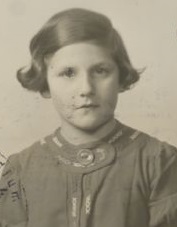
Brigitte Freidin was born into an Orthodox Jewish family in Augsburg, Germany on June 3, 1930. Her father, Siegfried, was a volunteer soldier during World War I and managed a furniture store. Her mother, Rita, took care of Brigitte, their only child, and spent her days cooking, a talent for which she was well known throughout town. Brigitte had a wonderful childhood, spending her time playing with other neighborhood children, visiting the local zoo, reading, and swimming in the municipal pool.
By the time Brigitte was old enough to go to school, Hitler and the Nazi party had come to power in Germany and implemented antisemitic legislation. Since Jewish children were not allowed to attend public schools, Brigitte went to school at the local synagogue. Eventually, Siegfried was forced to close his furniture store. However, his good relationship with his customers ensured that they continued to pay their bills owed to him. This allowed the family to survive for a time with some source of income.
As conditions for Jews worsened in Germany, Siegfried and Rita began to plan to immigrate to the United States, where Rita had a brother. The family submitted all of the necessary paperwork, but had to wait for their quota number to be called. To prepare for the move, Rita purchased furniture and other household goods which were stored in a lift van until it was time to move to America. Tickets for voyage to America were secured. Siegfried sent money to a Swiss bank account so that the family would have something to live on when they arrived in the States. Brigitte’s parents even took English lessons in preparation.
On the night of November 9, 1938, Brigitte woke to loud crashing noises and rocks being thrown through her window. Her parents pulled Brigitte into their bed to wait for the violence to stop. Below, they could hear their neighbors trying to break into the furniture store. In the morning, Brigitte answered a knock at the door. Staring back at her were two SS officers, who had come to arrest Siegfried. Her father was taken and held in the Dachau concentration camp for five months. Siegfried was released under the condition the family left Germany within three weeks.
The family went to England, where Siegfried had a first cousin, to await departure for America. Brigitte and her parents shared a single room in a small London apartment. Rita worked as a maid to help support the family. Since refugees were not technically allowed to work, Rita was paid in cash. Brigitte attended school but it was not until she was sent to the countryside at the outbreak of World War II in September 1939 that Brigitte learned English.
Just a few months later, Brigitte and her family left for America on The Volendam, the last cruise ship to leave England. The family took with them one large steamer trunk and approximately $30 in U.S. currency. The German government seized all of the belongings that were in storage.
The family arrived in New York City just after Christmas in 1939. They lived in the Bronx for a few months before permanently settling in Washington, D.C. where Rita had a first cousin. Rita found work sewing buttons onto shirts while Siegfried worked for a local furniture store. Brigitte adjusted well to school and life in America. She looked forward to receiving her ten cents every Saturday to see the double feature at the local movie theater.
Brigitte married her husband when she was twenty-one and had two children. She became an interior designer and was a volunteer at the United States Holocaust Memorial Museum.
